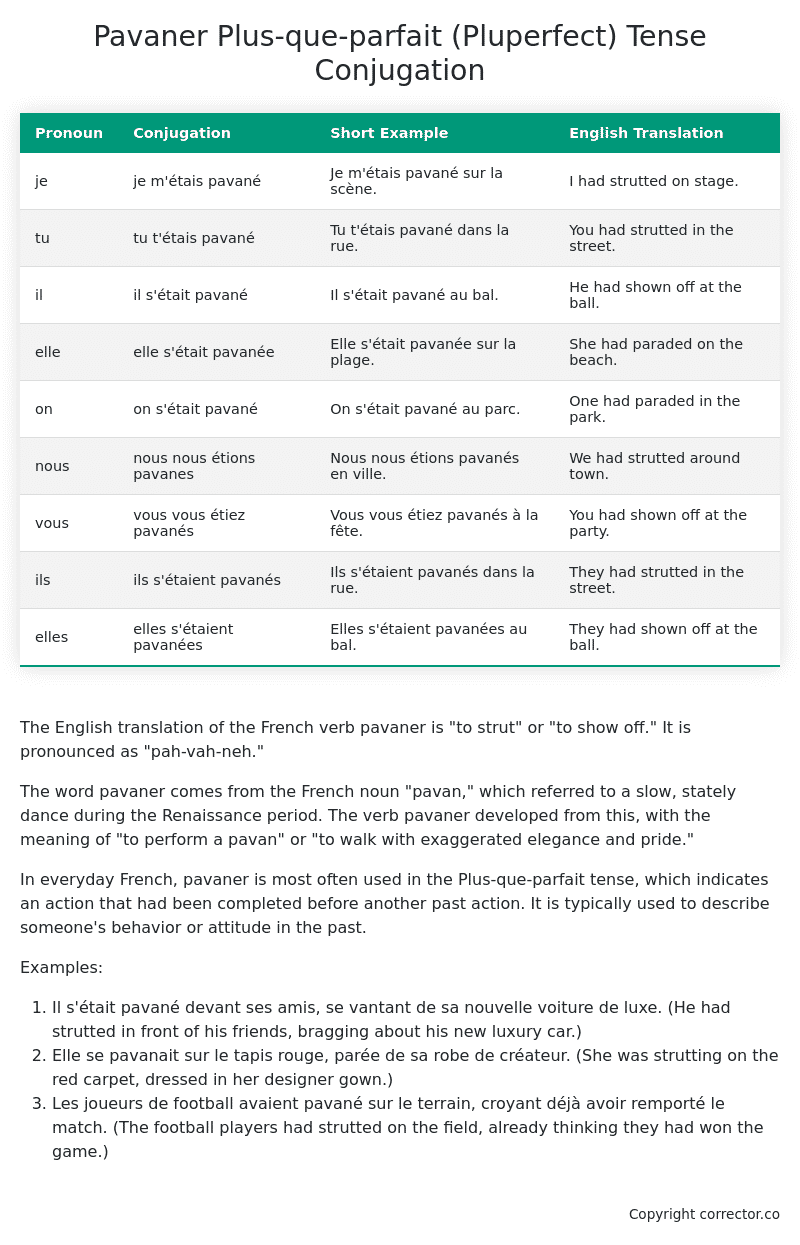Plus-que-parfait (Pluperfect) Tense Conjugation of the French Verb pavaner
Introduction to the verb pavaner
The English translation of the French verb pavaner is “to strut” or “to show off.” It is pronounced as “pah-vah-neh.”
The word pavaner comes from the French noun “pavan,” which referred to a slow, stately dance during the Renaissance period. The verb pavaner developed from this, with the meaning of “to perform a pavan” or “to walk with exaggerated elegance and pride.”
In everyday French, pavaner is most often used in the Plus-que-parfait tense, which indicates an action that had been completed before another past action. It is typically used to describe someone’s behavior or attitude in the past.
Examples:
- Il s’était pavané devant ses amis, se vantant de sa nouvelle voiture de luxe. (He had strutted in front of his friends, bragging about his new luxury car.)
- Elle se pavanait sur le tapis rouge, parée de sa robe de créateur. (She was strutting on the red carpet, dressed in her designer gown.)
- Les joueurs de football avaient pavané sur le terrain, croyant déjà avoir remporté le match. (The football players had strutted on the field, already thinking they had won the game.)
Table of the Plus-que-parfait (Pluperfect) Tense Conjugation of pavaner
| Pronoun | Conjugation | Short Example | English Translation |
|---|---|---|---|
| je | je m’étais pavané | Je m’étais pavané sur la scène. | I had strutted on stage. |
| tu | tu t’étais pavané | Tu t’étais pavané dans la rue. | You had strutted in the street. |
| il | il s’était pavané | Il s’était pavané au bal. | He had shown off at the ball. |
| elle | elle s’était pavanée | Elle s’était pavanée sur la plage. | She had paraded on the beach. |
| on | on s’était pavané | On s’était pavané au parc. | One had paraded in the park. |
| nous | nous nous étions pavanes | Nous nous étions pavanés en ville. | We had strutted around town. |
| vous | vous vous étiez pavanés | Vous vous étiez pavanés à la fête. | You had shown off at the party. |
| ils | ils s’étaient pavanés | Ils s’étaient pavanés dans la rue. | They had strutted in the street. |
| elles | elles s’étaient pavanées | Elles s’étaient pavanées au bal. | They had shown off at the ball. |
Other Conjugations for Pavaner.
Le Present (Present Tense) Conjugation of the French Verb pavaner
Imparfait (Imperfect) Tense Conjugation of the French Verb pavaner
Passé Simple (Simple Past) Tense Conjugation of the French Verb pavaner
Passé Composé (Present Perfect) Tense Conjugation of the French Verb pavaner
Futur Simple (Simple Future) Tense Conjugation of the French Verb pavaner
Futur Proche (Near Future) Tense Conjugation of the French Verb pavaner
Plus-que-parfait (Pluperfect) Tense Conjugation of the French Verb pavaner (this article)
Passé Antérieur (Past Anterior) Tense Conjugation of the French Verb pavaner
Futur Antérieur (Future Anterior) Tense Conjugation of the French Verb pavaner
Subjonctif Présent (Subjunctive Present) Tense Conjugation of the French Verb pavaner
Subjonctif Passé (Subjunctive Past) Tense Conjugation of the French Verb pavaner
Subjonctif Imparfait (Subjunctive Imperfect) Tense Conjugation of the French Verb pavaner
Subjonctif Plus-que-parfait (Subjunctive Pluperfect) Tense Conjugation of the French Verb pavaner
Conditionnel Présent (Conditional Present) Tense Conjugation of the French Verb pavaner
Conditionnel Passé (Conditional Past) Tense Conjugation of the French Verb pavaner
L’impératif Présent (Imperative Present) Tense Conjugation of the French Verb pavaner
L’infinitif Présent (Infinitive Present) Tense Conjugation of the French Verb pavaner
Struggling with French verbs or the language in general? Why not use our free French Grammar Checker – no registration required!
Get a FREE Download Study Sheet of this Conjugation 🔥
Simply right click the image below, click “save image” and get your free reference for the pavaner Plus-que-parfait tense conjugation!

Pavaner – About the French Plus-que-parfait (Pluperfect) Tense
Tense Formation
Common everyday usage patterns
Sequencing of past events
Background information
Hypothetical or reported speech
Interactions with other tenses
Summary
I hope you enjoyed this article on the verb pavaner. Still in a learning mood? Check out another TOTALLY random French verb conjugation!


